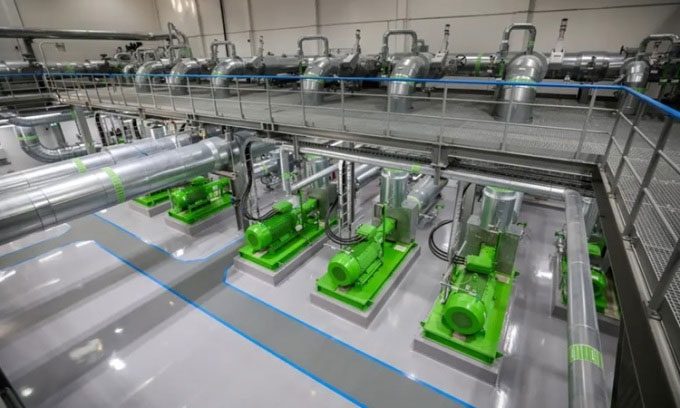Two scientists in France have discovered the largest white hydrogen deposit in the world, a clean energy source that could save the planet from the climate crisis.
Jacques Pironon and Philippe De Donato, directors at the French National Centre for Scientific Research, have found a white hydrogen deposit estimated to hold between 6 to 250 million tons. White hydrogen is a naturally occurring form of hydrogen and is relatively new to the scientific community. A 2018 study analyzed a well in Mali that produced 98% hydrogen gas, drawing the scientific community’s attention to this resource. Currently, researchers globally are highly interested in white hydrogen as it could help humanity accelerate its response to climate change, reported CNN on October 29, citing geochemist Viacheslav Zgonnik.

Inside a hydrogen power plant in Germany. (Photo: Jan Woitas/Picture Alliance).
Hydrogen energy is not a new idea. It only produces water when burned, making it an environmentally friendly energy source. However, it is only recently that scientists have been able to produce it in large quantities in laboratories. White hydrogen forms naturally within the Earth’s crust. Other types of hydrogen are synthetic products. These include green hydrogen, produced through the electrolysis of water into hydrogen and oxygen, and gray hydrogen, derived from methane gas.
Although hydrogen is the most abundant element, it always bonds with another molecule, making laboratory production essential. However, separating hydrogen requires a lot of energy and often involves using electricity from fossil fuels. Because it does not require any energy-intensive processes, climate experts believe that white hydrogen has several advantages. It is also cost-effective, with production costs estimated at around $1 per kg, compared to $6 per kg for hydrogen from other sources.
Several startups are exploring ways to commercialize white hydrogen. According to Geoffrey Ellis, a geochemist at the U.S. Geological Survey, the speed of this development is crucial to ensure that white hydrogen can help mitigate the climate crisis.




















































